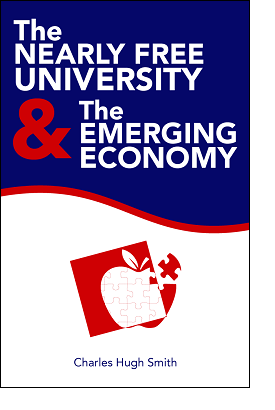Now That the U.S. and China Have Picked the Low-Hanging Fruit, Peak Everything Looms
With no plan to manage an economy in which expanding credit no longer generates growth, the two nations are rapidly reaching Peak Everything.
Let's call the strategy of picking all the low-hanging fruit in an economy Plan A: you know, expanding credit, lowering interest rates, building infrastructure, fueling speculative frenzies, all the good stuff that fans the flames of "growth."
Now that the central banks and political leadership of the U.S. and China have plucked all the low-hanging fruit, they have no Plan B. With no plan to manage an economy in which expanding credit no longer generates growth, the two nations are rapidly reaching Peak Everything:

Gordon T. Long and I discuss the ramifications of the low-hanging fruit having been plucked in this 26-minute slide presentation:
YouTube link
Of related interest:
What Happens After the Low-Hanging Fruit Has Been Picked? (April 2, 2014)
The Nearly Free University and The Emerging Economy:
The Revolution in Higher Education
Reconnecting higher education, livelihoods and the economyWith the soaring cost of higher education, has the value a college degree been turned upside down? College tuition and fees are up 1000% since 1980. Half of all recent college graduates are jobless or underemployed, revealing a deep disconnect between higher education and the job market.
It is no surprise everyone is asking: Where is the return on investment? Is the assumption that higher education returns greater prosperity no longer true? And if this is the case, how does this impact you, your children and grandchildren?

We must thoroughly understand the twin revolutions now fundamentally changing our world: The true cost of higher education and an economy that seems to re-shape itself minute to minute.
The Nearly Free University and the Emerging Economy clearly describes the underlying dynamics at work - and, more importantly, lays out a new low-cost model for higher education: how digital technology is enabling a revolution in higher education that dramatically lowers costs while expanding the opportunities for students of all ages.
The Nearly Free University and the Emerging Economy provides clarity and optimism in a period of the greatest change our educational systems and society have seen, and offers everyone the tools needed to prosper in the Emerging Economy.
Read Chapter 1/Table of Contents
print ($20) Kindle ($9.95)
Things are falling apart--that is obvious. But why are they falling apart? The reasons are complex and global. Our economy and society have structural problems that cannot be solved by adding debt to debt. We are becoming poorer, not just from financial over-reach, but from fundamental forces that are not easy to identify. We will cover the five core reasons why things are falling apart:
 1. Debt and financialization
1. Debt and financialization2. Crony capitalism
3. Diminishing returns
4. Centralization
5. Technological, financial and demographic changes in our economy
Complex systems weakened by diminishing returns collapse under their own weight and are replaced by systems that are simpler, faster and affordable. If we cling to the old ways, our system will disintegrate. If we want sustainable prosperity rather than collapse, we must embrace a new model that is Decentralized, Adaptive, Transparent and Accountable (DATA).
We are not powerless. Once we accept responsibility, we become powerful.
Read the Introduction/Table of ContentsKindle: $9.95 print: $24
| Thank you, James W. ($150), for your outrageously generous contribution to this site -- I am greatly honored by your steadfast support and readership. | Thank you, Richard P. ($10/month), for your monstrously generous subscription to this site -- I am greatly honored by your support and readership. |



























